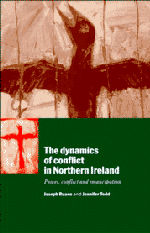Book contents
- Frontmatter
- Contents
- List of figures
- List of tables
- Preface
- 1 Introduction
- 2 Historical formations
- 3 The reconstruction of communal division
- 4 Ideology and conflict
- 5 The dynamics of conflict: politics
- 6 The dynamics of conflict: the economy
- 7 The dynamics of conflict: culture
- 8 The British context of the Northern Ireland conflict
- 9 The Republic of Ireland and the conflict in Northern Ireland
- 10 The international context
- 11 An emancipatory approach to the conflict
- Epilogue
- Appendix
- Bibliography
- Index of names
- Index of subjects
6 - The dynamics of conflict: the economy
Published online by Cambridge University Press: 18 December 2009
- Frontmatter
- Contents
- List of figures
- List of tables
- Preface
- 1 Introduction
- 2 Historical formations
- 3 The reconstruction of communal division
- 4 Ideology and conflict
- 5 The dynamics of conflict: politics
- 6 The dynamics of conflict: the economy
- 7 The dynamics of conflict: culture
- 8 The British context of the Northern Ireland conflict
- 9 The Republic of Ireland and the conflict in Northern Ireland
- 10 The international context
- 11 An emancipatory approach to the conflict
- Epilogue
- Appendix
- Bibliography
- Index of names
- Index of subjects
Summary
The conflict in Northern Ireland has an economic aspect. Unequal access to economic resources is an important source of Catholic grievance; the political power of Protestants is underpinned by their economic power; the policies of the British government first helped maintain, then moderate, and more recently erode Protestant economic power. To stress the role of economic factors is not to argue that economic motives have primacy over political; there is not a stark opposition between the ‘economic’ and the ‘national’ or ‘constitutional’. On the contrary, for both Protestants and Catholics there is an interpenetration of material, symbolic and strategic meanings which blurs the boundaries between the economic, political and cultural domains.
Origins of Protestant economic power
English assertion of control over Ireland in the sixteenth and seventeenth centuries was not motivated primarily by economic considerations but economic interests were involved – Ireland would be an outlet for excess population in England and an opportunity for speculative investment while economic development would make English government in Ireland self-financing and could yield a surplus to the Crown. It was also clear that the settlers required a firm economic base if they were to carry out their intended political role. That base was established by transferring ownership of the land from Catholic to Protestant, by progressive displacement of Catholic tenants and by creating Protestant dominated networks of towns and trades.
This development went farthest in Ulster which saw the largest numbers of settlers and the widest extent of native clearance. On foot of official and private plantations Protestants came to dominate the more fertile regions of the province, particularly the Lagan, Bann and Foyle basins, while Protestant (largely Presbyterian) traders, manufacturers and artisans dominated the port and inland towns.
- Type
- Chapter
- Information
- The Dynamics of Conflict in Northern IrelandPower, Conflict and Emancipation, pp. 150 - 177Publisher: Cambridge University PressPrint publication year: 1996



